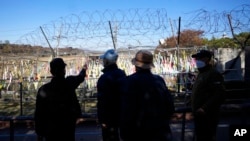A massive information campaign directed against North Korea could be used as a pressure tactic to compel the regime to deescalate tensions with the West as its leader Kim Jong Un fears his people equipped with outside information more than the U.S. military, said experts.
Experts said in addition to deterrence, Washington should employ an information pressure tactic to prompt the regime to change its behavior.
David Maxwell, a senior fellow at the Foundation for Defense of Democracies, said the North Korean people “armed with information are an existential threat to the regime and considered a great threat than the U.S. military.”
Maxwell continued, “An overt information warfare campaign cannot only support deterrence and diplomacy, but it can also create a dilemma for Kim Jong Un and cause pressure that leads to changes in behavior and decision-making or simply a change inside North Korea.”
Sending North Korea "massive quantities of information from entertainment to news" could open people's understanding about the outside world and their "inalienable and universal rights" as well as the "truth about the Kim regime," Maxwell said. The outside information could even cover such educational topics as improving crop yields, he added.
Getting information to North Koreans would include increasing the number of hours that defector groups broadcast into North Korea, influencing North Korean elites overseas to bring information into the country, and to restart loudspeaker broadcasts at the interKorean border, said Bruce Bennett, a senior defense analyst at the Rand Corp.
Words and weapons
North Korea, built on a socialistic ideology of self-reliance or Juche, which calls on the regime to become economically and politically independent of foreign reliance, maintains a strict control over its people. Pyongyang shields its citizens from outside information, including all forms of media that could undermine its ability to mobilize its people and resources to work toward its goals.
Calling its nuclear weapons, “the treasure sword” of Juche, North Korea has been continuing to develop its nuclear and ballistic missile programs despite international condemnations and sanctions outlawing them.
Many experts have suggested that North Korea uses its weapons programs to safeguard survival against foreign dominance and to keep the dynastic autocracy of the Kim family in power.
To continue building its weapons program and maintaining the legitimacy of the regime, North Korea’s Propaganda and Agitation Department pumps out propaganda aimed at enforcing its ideology to tie people’s loyalty to the regime. The department also blocks exposure to foreign information.
More recently, due to the growing number of North Koreans watching South Korean television shows, better known as K-dramas or listening to the music known as K-pop smuggled in from China on USB drives, Pyongyang cracked down on offenders, sometimes sentencing them to death in accordance with its anti-reactionary ideology law.
The law, passed Dec. 5, 2020, amid the country’s strict border closures in response to the COVID-19 pandemic, allowed widespread suppression of foreign media.
Kim fears pressure
Bennett, of the Rand Corp., said, “Whether or not the information necessarily changes people in North Korea, [the influx of information is] putting pressure on [Kim] about something he really doesn’t want to have happened.”
“Using information proactively by threatening to flood North Korea with different kinds of information is what’s key. That’s how you deter him. And if he is not deterred and goes ahead [with] provocations, then, we send that information into North Korea,” he added.
North Korean defector groups in Seoul airlifted huge balloons filled with anti-Kim leaflets across the inter-Korean border for years until the activity was banned by the former government of Moon Jae-in in March 2021.
South Korean Unification Minister Kwon Yong-se said earlier this month that the anti-leaflet law should be ruled unconstitutional.
In the past, when South Korea blasted K-pop songs and propaganda messages through loudspeakers across the inter-Korean border of the demilitarized zone (DMZ) in August 2015, Kim ordered its military to go on a “semi-war state” and fired several rockets and artillery shots.
South Korea’s loudspeaker broadcasting was turned off in April 2018 as a preparation for the inter-Korean summit held that month and has been quiet since.
Sung-yoon Lee, an assistant professor of Korean studies at Tufts University, said, “South Korea should resume loudspeaker broadcasts into the North” and “drape over the speakers an oversized picture of Kim Jong Un, and the North Korean soldiers will not dare shoot.”
Harry Kazianis, president of the Rogue States Project, said informing the North Korean people about the truth of the Kim regime and outside world is “an underappreciated way to pressure Pyongyang” that could be “effective” at changing its behavior.
But Kazianis said he sees “no signs” that the Biden administration is willing to employ an information warfare strategy that could escalate tensions with North Korea.
He added, “However, I think all bets are off if North Korea tests a nuclear weapon, as Biden will be under pressure to do more and respond to critics.”
Different effects
Some experts said getting foreign information into North Korea would not cause immediate or positive changes in the regime’s behavior.
Evans Revere, a former State Department official with extensive experience negotiating with North Korea, “The posture of the regime itself seems unlikely to change in the near term, since public opinion does not really play a role in determining the regime’s policies on nuclear weapons and relations with the United States.”
Susan Thornton, former acting assistant secretary of state for East Asia and Pacific Affairs during the Trump administration, said she does not think “an information campaign would have any effect on regime behavior except to make them angry because such information campaign aims to threaten the security of the regime [leading] them to [do] more provocations, not less.”




